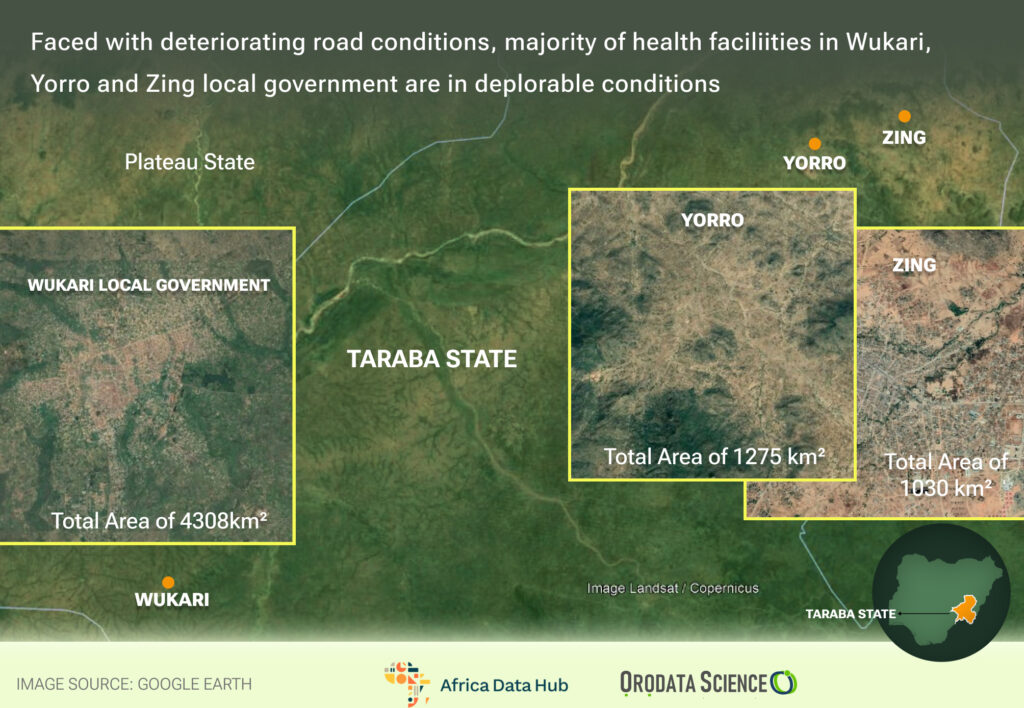The state of Primary Healthcare Centre’s in Nigeria is an appalling reflection of a failed system. Ironically, these centers designed to cater for the immediate needs of locals are akin to death traps, where life-saving treatments are administered amidst an aura of imminent death pervading the atmosphere and paths leading up to them.
Thus, our research into the workability of these centers was truly a voyage into uncharted waters, fraught with danger from lurking death that preys on unsuspecting victims within these localities. Below is a detailed account of our journey through this perilous terrain:
The study was conducted in three Local Government Areas of Taraba State, Nigeria. Specifically, these were strategically selected centers representing various regions within the state: Wukari, located in the Southern region, and other Primary Healthcare Centers situated in Yorro and Zing found in the Northeastern part. The arduous journey to each location revealed a grim reality as we encountered deteriorating road conditions indicative of neglect and abandonment.
The initial stop was at the healthcare facility located in Dankum, situated within the Yorro Local Government Area. The journey to this destination involved a lengthy motorcycle ride that eventually necessitated continuing on foot, not to mention the crossing of a river that involved literal walking on the water. Upon arrival, one was confronted with decrepit structures, inadequate medical apparatus, and a dearth of crucial medications. The storage room was in disarray while the pharmaceutical section lacked proper medical equipment and organization.
Assessing the state of facilities in Laapo, a village in Zing Local Government Area presents a more complex challenge compared to other locations. The state of the hospital itself bore witness to a system that has failed its citizens. The primary healthcare center was found locked and inaccessible, requiring diligent inquiry before an attendant finally arrived. This disorganized state of affairs portended grave difficulties for those in need of urgent medical attention. This tender much to meritoriously undermine the viability and the sustenance of health care centers which was supposedly designed to cater for the immediate needs of patients.

In other PHCs, particularly Tunapo in Zing Local Government and Kajong in Yorro Local Government, the wards are in a deplorable condition. Tunapo particularly has only a ward that serves multi purpose with a supposed store that has a damaged and leaking roof directly on the hospital equipment. In the case of Kajong, the labor room resembles a slaughterhouse where mothers struggle to survive childbirth alongside their newborns and roof leaking directly on a patient bed in a ward.
The voyage to Kente in Wukari Local Government Area proved to be even more treacherous than previous excursions, as the motorcycle ride was fraught with peril.

Evidently, patients who seek medical attention at primary healthcare centers in Taraba State are often met with dilapidated buildings, inadequate medical equipment, and limited drug supply. This dire situation has led to unfavorable health outcomes for patients, particularly those residing in rural areas.
Staffing and Remuneration for Workers in PHCs
It remains a lamentable reality that on a daily basis, there is an exodus of proficient Nigerians, particularly in the medical field, as they seek better opportunities in foreign lands. This is especially evident when one considers the staffing levels, quality of care and remuneration for staff at primary healthcare centers in rural areas where research has been conducted.
In these regions, the absence of qualified physicians attending to the medical needs of locals leaves them at the mercy of inadequately trained attendants who fail to meet universal standards required for such positions. It is truly disheartening to note because this unfortunate situation is responsible for high mortality rates in primary healthcare centers, and it is even more troubling that most healthcare facilities lack attendants altogether.
The compensation provided to these attendants is not only inadequate, but also unsatisfactory. Consequently, we observe instances of negligent conduct among certain attendants who exploit the resources available for personal gain, thereby compromising their dedication towards their duties. This trend appears to be ubiquitous across all locations and has resulted in shortages of chairs, beds and bed sheets within hospital wards. Addressing this issue effectively necessitates that the government reassess remuneration packages for medical staff and establish opportunities for ongoing professional development in modern medicine practices given that many are ill-equipped for its complexities.


It Is imperative that the government takes urgent action to address the staffing and remuneration challenges faced by primary healthcare centers. This will require a comprehensive approach that includes providing adequate compensation packages for medical staff, creating opportunities for ongoing professional development, and implementing measures to ensure that attendants are held accountable for their actions. Failure to do so will only exacerbate the already dire situation and lead to further losses of life in rural communities. It is time for our leaders to prioritize the health and well-being of all citizens by investing in our healthcare system and ensuring that it is staffed with qualified professionals who are properly compensated for their work.
To address this issue, there is an urgent need for the government to increase funding for the healthcare sector and prioritize the rehabilitation and equipping of primary healthcare centers across the state. Additionally, efforts should be made to attract and retain qualified medical personnel to work in these centers.
Improving the state of primary healthcare centers in Taraba State will not only improve health outcomes for its citizens but also contribute to the overall development of the state. It is time for all stakeholders to come together and take decisive action towards achieving this goal. As the saying goes, “Health is Wealth!”
“This story was produced for the Frontline Investigative Programme and supported by the Africa Data Hub and Orodata Science.”

